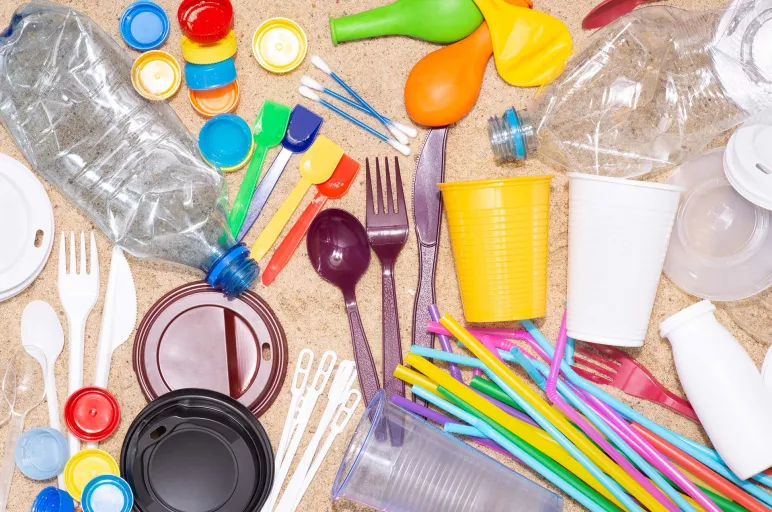
Single-Use Plastics: A Necessary Evil During the Pandemic
September 02, 2020 | Packaging
As the COVID-19 pandemic led to extraordinary changes in the lives of people all over the world, various industries have been reeling under its impacts with lower demand, disruptions in supply chains and labor shortages. Hospitality, airlines, construction and automotive industries have been among the worst affected. A handful of industries have been able to weather these shocks with a few of them even able to take advantage of the situation. One such industry is single-use plastics or SUPs.
Until recently, SUPs were being steadily banned from use in every major country in the world. From that slow but ultimate demise, SUPs have somehow risen to be one of the most useful items in the post-pandemic world. The journey of SUPs in the last six months is indeed fascinating and worrying by many accounts. How has the SUP industry managed such a comeback? What will be the impact of this comeback? We must delve a bit into the past before we can understand what is happening in the present.
Before the Pandemic: An Industry in Slow Decline
What are SUPs? Any plastic that is meant to be used once and then discarded or recycled, a single-use plastic. This includes plastic bags, beverage bottles, disposable utensils, packaging wraps and even plastic ribbons and wet wipes. SUPs also include plastic products that can be recycled. In the last two decades, SUPs became essential to our lives. Although the advantages and convenience they brought into our lives are undebatable, the continuous use of SUPs also had an undebatable effect on the environment, one that was terrible, massive and is slowly turning out to be irreversible.
With current recycling rates and available technology, recycling as an option also turned out to be too little and too late to curb the SUP menace. A 2018 report estimated that the world annually generates around 350 million tons of plastic waste, of which only 16% is recycled.
These alarming trends saw intense pressure being put on world governments by environmental activists as well as consumers themselves. Before the coronavirus pandemic, the governments of several countries had undertaken serious measures to reduce the use of SUPs, which put the industry on the backfoot. Consumer awareness had also led to a substitution of SUP products in many countries. By the start of 2020, it almost looked like the SUP industry was on a slow but definite decline. Just then, a new novel coronavirus spreading across the globe breathed new life into the SUP industry. A product that was considered a villain and one of the greatest threats to mankind just a few days ago was now at the forefront of the fight against COVID-19.
The Pandemic To the Rescue?
The pandemic and subsequent lockdowns significantly changed consumer buying behavior. People across the world stuffed their refrigerators and storages with packaged food and beverage products, hand sanitizers and other sanitary items. Almost all these products come wrapped in some kind of single-use plastic. The demand for takeaway food from restaurants and food outlets increased as people were confined to their homes, increasing the use of SUP bags, bottles, containers and utensils. The most significant impact of the pandemic on the SUP industry was the increasing suspicion of consumers on reusable bags and related products. Before the pandemic, many shops, restaurants, cafes and retail outlets promoted the use of reusable products such as cloth bags, reusable coffee mugs, cups and plates. The outbreak of COVID-19 dented these hard-fought and slow measures significantly as the dangers of exposure to the virus from reusable products led consumers and shop owners to temporarily stop using reusable products. For instance, Starbucks announced a temporary pause in the use of reusable cups across their global outlets in view of the pandemic.
The plastic industry also started actively lobbying against reusable products and started promoting SUPs as the most convenient substitute. In a letter written in March to the U.S. Department of Health and Human Services, the Plastic Industry Association argued that SUPs were the safest option for the consumers during the pandemic. Aggressive campaigning by plastic industry stakeholders led to many governments either lifting their ban on SUPs even banning the use of reusable bags instead. However, many environmentalists have pointed out that plastic industry lobbyists have used the pandemic to fester sentiments against reusable products. The coronavirus, for instance, remains as active on a plastic surface as a metal surface.
What’s Next?
Years of effort by environmentalists, policy makers and businesses to make the world reduce its dependence on SUPs have been set back significantly over the last six months. On the other hand, the advantages offered by SUP products during the pandemic, without the availability of suitable substitutes, cannot be denied. SUPs are being extensively used to keep food contaminant-free, to produce masks, gloves and other protective equipment and even to manufacture syringes and other key healthcare equipment.
However, the effects of this widespread use of SUP products will also have consequences. In July, the WHO estimated that around 16 million gloves and 89 million masks are being used across the globe every month on account of the pandemic. Much of this plastic will end up in landfills and the ocean. A 2018 UN report claims that around 13 million tons of plastic is dumped into the ocean each year. These numbers are going to increase in 2020. The pandemic has also shown us that SUPs will continue to be used by humankind in the near future, albeit in a lower amount compared to what we use in present times. In that sense, SUPs have turned out to be a necessary evil in our lives. It is up to the governments, industry stakeholders and policy makers to decide how much of it will be recycled and how much will be left to seep into our underground water systems, farmland, marine life and our own bodies.
References
- https://science.howstuffworks.com/environmental/conservation/issues/single-use-plastics.htm
- https://theconversation.com/covid-19-has-resurrected-single-use-plastics-are-they-back-to-stay-140328
- https://www.weforum.org/agenda/2020/04/plastic-packaging-coronavirus-crisis/
- https://indianexpress.com/article/opinion/columns/covid-19-plastic-pollution-environment-6489034/
- https://pubs.acs.org/doi/10.1021/acs.est.0c02269
- https://www.equaltimes.org/what-does-the-coronavirus-mean-for?lang=en#.XzEO7SgzY2w
- https://www.consilium.europa.eu/en/press/press-releases/2019/05/21/council-adopts-ban-on-single-use-plastics/
Turn ideas into action. Talk to GEP.
GEP helps enterprise procurement and supply chain teams at hundreds of Fortune 500 and Global 2000 companies rapidly achieve more efficient, more effective operations, with greater reach, improved performance, and increased impact. To learn more about how we can help you, contact us today.

David Doran
Vice President, Consulting
David has over 20 years of experience in leading several large-scale consulting and sourcing engagements for transport and logistics at Fortune 500 companies.
A recognized leader in supply chain management and logistics, David plays a critical role in the design, sourcing and implementation of supply chain improvements to GEP’s global clients.



